外研版-英语-九上-九上Module9 3单元 优秀教案
- 格式:doc
- 大小:699.50 KB
- 文档页数:7
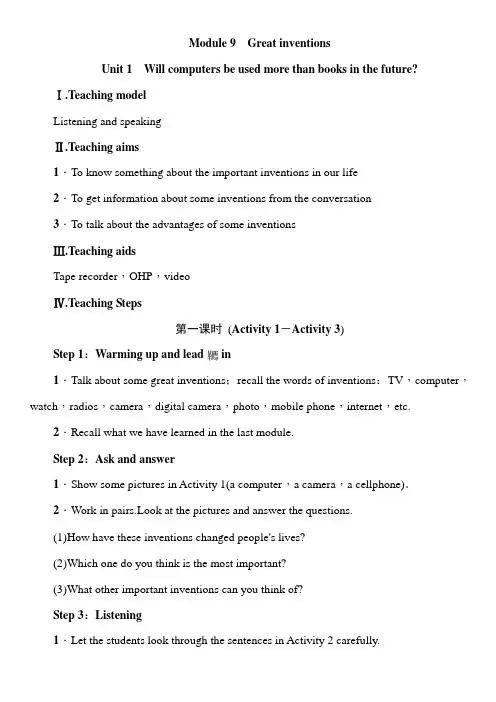
Module 9Great inventionsUnit 1Will computers be used more than books in the future?Ⅰ.Teaching modelListening and speakingⅡ.Teaching aims1.To know something about the important inventions in our life2.To get information about some inventions from the conversation3.To talk about the advantages of some inventionsⅢ.Teaching aidsTape recorder,OHP,videoⅣ.Teaching Steps第一课时(Activity 1-Activity 3)Step 1:Warming up and lead in1.Talk about some great inventions;recall the words of inventions:TV,computer,watch,radios,camera,digital camera,photo,mobile phone,internet,etc.2.Recall what we have learned in the last module.Step 2:Ask and answer1.Show some pictures in Activity 1(a computer,a camera,a cellphone).2.Work in pairs.Look at the pictures and answer the questions.(1)How have these inventions changed people's lives?(2)Which one do you think is the most important?(3)What other important inventions can you think of?Step 3:Listening1.Let the students look through the sentences in Activity 2 carefully.2.Play the tape.Listen and complete the sentences.(1)Lingling loves her mobile phone because she can________.(2)All of Daming's friends' numbers are ________in his phone.(3)Today's cameras are better than old cameras because they do not ________and the photos can________.(4)Lingling thinks everything ________by computers to some degree,so the computer is ________invention.3.Let students read the sentences aloud.4.Then play the tape again,and check the answers.Step 4:Listening and reading1.Play the tape.Let the students listen to the conversation in Activity 3 and answer the following questions:(1)What does Tony want to borrow from his father?(2)How do people get information now according to the conversation?(3)How many inventions are mentioned in the conversation?2.Read it and underline all the points which are important to the class.3.Show the points to the class,and explain some difficulties to them.4.Read the summary of the conversation.Underline the wrong information and correct it.Then share it with the class.5.Ask the students to work in pairs,and act out the conversation.Step 5:Everyday EnglishI wonder…Perhaps.Here it is.Promise!Step 6:Homework1.Learn the new words by heart.2.Act out the conversation in groups.3.Finish off the workbook exercises.Blackboard DesignUnit 1Will computers be used more than books in the future? 1.invent/invention/inventor2.borrow/lend3.will be used4.can be seen on the Internet5.hear from6.take good care of it。
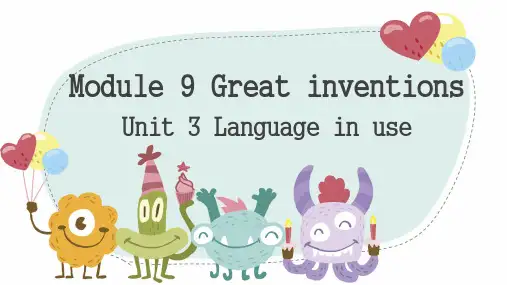
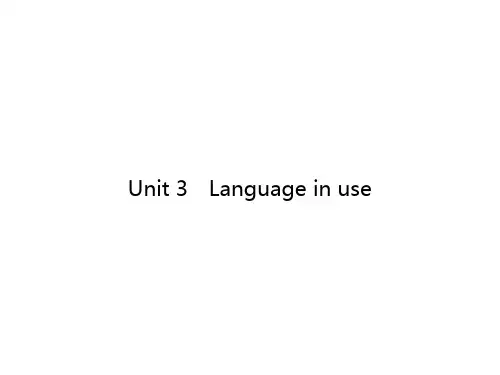
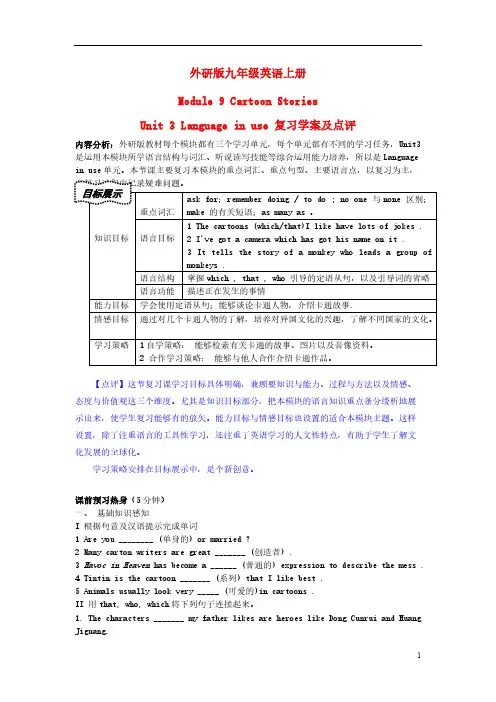
外研版九年级英语上册Module 9 Cartoon StoriesUnit 3 Language in use 复习学案及点评内容分析:外研版教材每个模块都有三个学习单元,每个单元都有不同的学习任务,Unit3 是运用本模块所学语言结构与词汇、听说读写技能等综合运用能力培养,所以是Language in use单元。
本节课主要复习本模块的重点词汇、重点句型、主要语言点,以复习为主,【点评】这节复习课学习目标具体明确,兼顾要知识与能力、过程与方法以及情感、态度与价值观这三个维度。
尤其是知识目标部分,把本模块的语言知识重点条分缕析地展示出来,使学生复习能够有的放矢。
能力目标与情感目标也设置的适合本模块主题。
这样设置,除了注重语言的工具性学习,还注重了英语学习的人文性特点,有助于学生了解文化发展的全球化。
学习策略安排在目标展示中,是个新创意。
课前预习热身(5分钟)一、基础知识感知I 根据句意及汉语提示完成单词1 Are you ________ (单身的) or married ?2 Many carton writers are great _______ (创造者) .3 Havoc in Heaven has become a ______ (普通的) expression to describe the mess .4 Tintin is the cartoon _______ (系列) that I like best .5 Animals usually look very _____ (可爱的)in cartoons .II 用that, who, which将下列句子连接起来。
1. The characters _______ my father likes are heroes like Dong Cunrui and Huang Jiguang.2. He has a new pen _______ has got his name on it.3. My sister drew a tiger _______ has no ears.4. I met a crying boy _______ lost his way yesterday.5. The girl _______ often helps me with my English is from America.二、预习小测1【2012山东滨州】—What are you looking for?—I'm looking for the ring ______my husband bought me last year.A. thatB. whoC. whomD. it2【2012.广东】43. The woman ________ bought a doll for me is my aunt.A. whoB. whoseC. whomD. which3 【2011资阳】—I hear that Lily’s brother is a worker here.—Look, the man _________ is working over there is her brother.A. whoB. whomC. whatD. which4 【2011湘西】Do you know the girl _________ is singing in the classroom?A. whenB. whoC. which5 【2012浙江衢州】 — What are you looking for?— I'm looking for the pen________ my father gave me last week.A. whoB. whichC. whoseD. whom设计意图:课前预习热身环节是温故而知新,利用上节课学过的词汇和语法进行复习并导入新课,可以自评,也可以同桌互评,看谁掌握的知识最好。
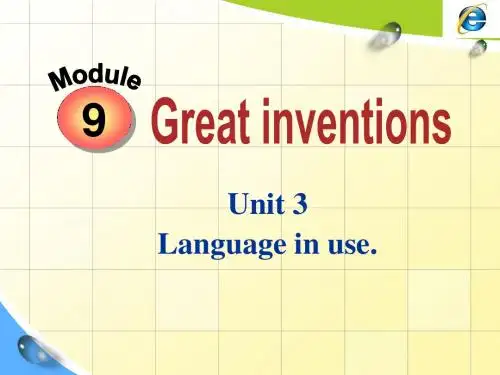
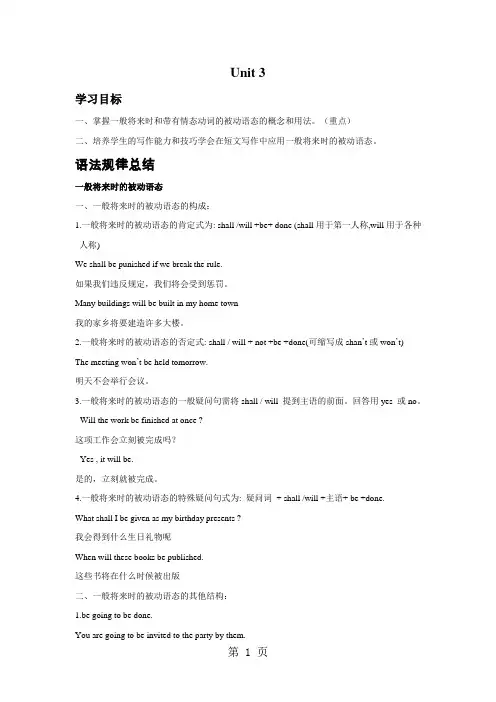
Unit 3学习目标一、掌握一般将来时和带有情态动词的被动语态的概念和用法。
(重点)二、培养学生的写作能力和技巧学会在短文写作中应用一般将来时的被动语态。
语法规律总结一般将来时的被动语态一、一般将来时的被动语态的构成:1.一般将来时的被动语态的肯定式为: shall /will +be+ done (shall用于第一人称,will用于各种人称)We shall be punished if we break the rule.如果我们违反规定,我们将会受到惩罚。
Many buildings will be built in my home town我的家乡将要建造许多大楼。
2.一般将来时的被动语态的否定式: shall / will + not +be +done(可缩写成shan’t或won’t)The meeting won’t be held tomorrow.明天不会举行会议。
3.一般将来时的被动语态的一般疑问句需将shall / will 提到主语的前面。
回答用yes 或no。
- Will the work be finished at once ?这项工作会立刻被完成吗?- Yes , it will be.是的,立刻就被完成。
4.一般将来时的被动语态的特殊疑问句式为: 疑问词+ shall /will +主语+ be +done.What shall I be given as my birthday presents ?我会得到什么生日礼物呢When will these books be published.这些书将在什么时候被出版二、一般将来时的被动语态的其他结构:1.be going to be done.You are going to be invited to the party by them.你将会被他们邀请参加那个晚会2.bo to be doneThe sports meeting is to be held on April 10.运动会将于4月10日举行三、一般将来时的被动语态的用法:1.一般将来时的被动语态同它的主动语态一样,表示根据计划或安排将要发生的被动性动作。
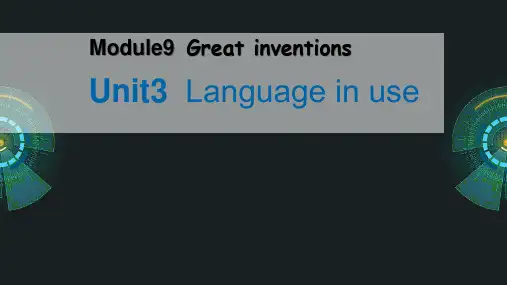
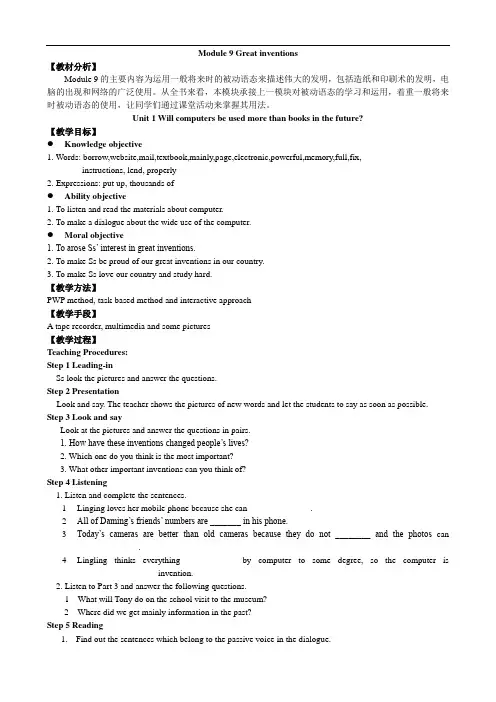
Module 9 Great inventions【教材分析】Module 9的主要内容为运用一般将来时的被动语态来描述伟大的发明,包括造纸和印刷术的发明,电脑的出现和网络的广泛使用。
从全书来看,本模块承接上一模块对被动语态的学习和运用,着重一般将来时被动语态的使用,让同学们通过课堂活动来掌握其用法。
Unit 1 Will computers be used more than books in the future?【教学目标】●Knowledge objective1. Words: borrow,website,mail,textbook,mainly,page,electronic,powerful,memory,full,fix,instructions, lend, properly2. Expressions: put up, thousands of●Ability objective1. To listen and read the materials about computer.2. To make a dialogue about the wide use of the computer.●Moral objective1. To arose Ss’ interest in great inventions.2. To make Ss be proud of our great inventions in our country.3. To make Ss love our country and study hard.【教学方法】PWP method, task-based method and interactive approach【教学手段】A tape recorder, multimedia and some pictures【教学过程】Teaching Procedures:Step 1 Leading-inSs look the pictures and answer the questions.Step 2 PresentationLook and say. The teacher shows the pictures of new words and let the students to say as soon as possible. Step 3 Look and sayLook at the pictures and answer the questions in pairs.1. How have these inventions changed people’s lives?2. Which one do you think is the most important?3. What other important inventions can you think of?Step 4 Listening1. Listen and complete the sentences.1Linging loves her mobile phone because she can ______________.2All of Daming’s friends’ numbers are _______ in his phone.3Today’s cameras are better than old cameras because they do not ________ and the photos can ______________.4Lingling thinks everything ___________ by computer to some degree, so the computer is __________________ invention.2. Listen to Part 3 and answer the following questions.1 What will Tony do on the school visit to the museum?2 Where did we get mainly information in the past?Step 5 Reading1.Find out the sentences which belong to the passive voice in the dialogue.1 They’ll be put up on the school website.2 And they can be seen on the Internet by other classes.3 Will computers be used more than books in the future?2.Now read the summary of the conversation. Underline the wrong information and correct it.Tony wants to borrow his father’s camera and take some photos of the school dance and the basketball match. The phot os will be shown in the school magazine. Tony’s dad lends the camera. He promises Tony to look after it.3.Find the sentences in the conversation which mean:1 Changing the subject, can I get the camera?2. It is not a problem. I will use another memory card.3 I will do what you tell me to do.4.Answer the questions.electronic fix instruction invention lend mail page website1 How do you fix a camera if the memory is full?2 When do you need to read the instructions?3 How often do you send messages by mail?4 How many pages does this book have?5 Which website do you often go to when you get online?6 What is an example of electronic technology?7 When you lend something to someone, what do they have to do later?8 What do you think is the most important invention in human history?Step 6 Everyday EnglishLet Ss say the everyday English that they have learnt in the passage.•I wonder …•Perhaps.•Here it is.•Promise!Step 7 Language points1. Can I borrow your camera?borrow表示“借入”lend表示“借出”borrow sth. from sb. 表示“向某人借某物”。
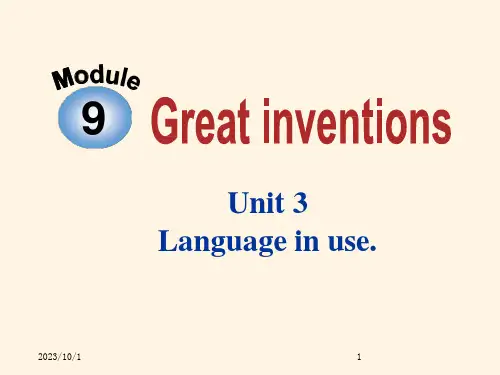
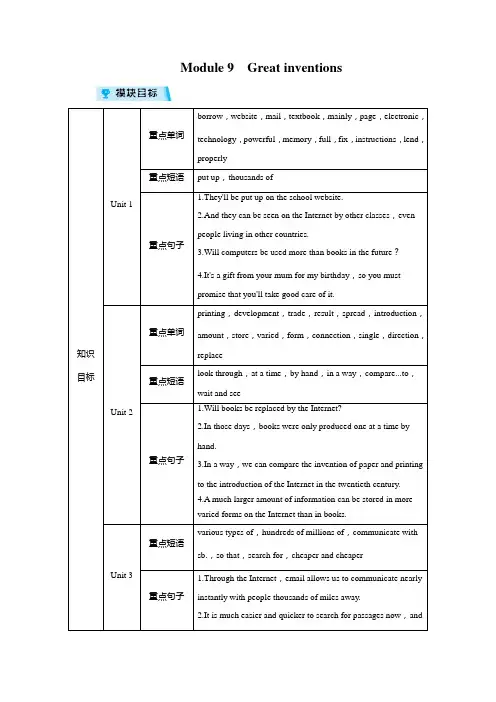
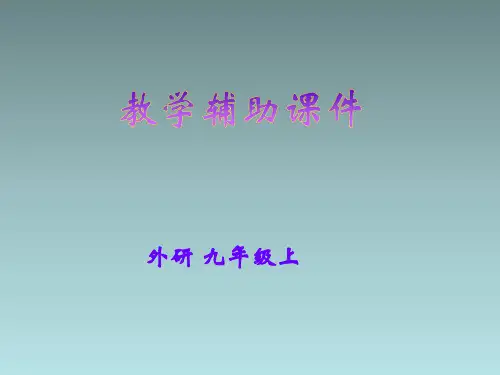
九上Module 9 Unit 3 优秀教案【教学目标】●Knowledge objectiveGet the students to be able to use the new words and expressions they learnt in this module.●Ability objectiveTo summarize and consolidate the passive voice of the simple future tense.●Moral objectiveTo be proud of our great nation and to be proud as a Chinese person.【教学重点】To be able to use the passive voice of the simple future tense.【教学难点】Through listening, speaking and writing, let students practise the passive voice of the simple future tense.【教学方法】PWP method, task-based method【教学手段】A tape recorder, multimedia and some pictures【教学过程】Teaching Procedures:Step 1 Warming upLook at the pictures and answer the questions.Step 2 Language practiceComplete the following sentences.1. They ____________ on the school website.2. _____ computers _______ more than books in the future?3. _____ books __________ by the Internet?Keys: will be put up, Will, be used, Will, be replacedStep 3 GrammarThe structure of the passive voice.Step 4 Complete the sentences and conversations with the correct form of the words and expressions in brackets1. ____ books ________ (replace) by computers in the future?2. My bike is broken. It _________ (fix) tomorrow.3. —Dad, can I use the Internet this evening?—Yes, but the computer is not on yet. The electricity ___________ (not connect) until nine o’clock.4. _____ the problem _____________ (talk about) at the meeting tomorrow?5. Who ____________ (invite) to give a report about great inventions next Friday?6. —When _____ the work __________ (finish)?—In two days.Keys: 1. Will, be replaced 2. will be fixed 3. won’t be connected 4. will be talked about5. will be invited6. will, be finishedStep 5 Look and sayLook at the pictures and describe the new classroom that will be built. Use the words in the box to help you.build, buy, changeA new classroom will be built.Keys: A new floor will be built.New furniture (desk/ chairs) will be bought.A new blackboard will be bought.The windows and the door will be changed.The teacher’s desk will be p ainted.The lights will be changed.The color of the walls will be changed.The walls will be fixed.…Step 6 TalkingWork in pairs. Talk about these great inventions.●1875●America●Alexander Graham BellA: When was the telephone invented?B: It was invented in 1875.…A: What kind of telephone do you think will be made in the future? B: …●1903●America●Wright Brothers●1924●Britain●John Logie BairdStep 7 Complete the sentences with the words in the box direction, introduction, spread, trade 1Before the ___________ of printing, few people could read.2There were more books to sell, so the _____ in books grew.3Because more people could read, ideas ______ quickly.4What ________ will printing take in the future?Keys: introduction, trade, spread, directionStep 8 Listening1. Listen and find out where the speaker is.a). In a school library.b). In the British Library.c). In the British Museum.Keys: b2 .Listen again and answer the questions.1. Why were so few books produced in ancient times?2. Why were many old books copied onto a computer?3. How has the computer helped people read old books in the British Library?Keys: 1. Because they were written by hand.2. They are too valuable to be picked up and held in the hand.3. Old books were copied onto a computer a few years ago for people to be able toread them without touching them.Step 9 Reading1.Read the passage and choose the best title.a) The history of the Internetb) The World Wide Webc) The Internet and the Webd) The future of the InternetKeys: c2.Read the passage and answer the questions.1. When was the Internet invented by the US government?2. What could people only send at first?3. Who invented the World Wide Web in 1991?4. Can people use e-commerce and online shopping to buy and sell things?Keys: 1. In the 1960s.2. They could only send very simple texts.3. A British scientist named Tim Berners-Lee.4. Yes, they can.3.Now complete the time table.In the 1960s: The Internet was invented for the army to use.In the 1970s: Scientists and businesspeople wanted to use the Internet to send and receive messages.In 1991: The World Wide Web was invented.In the 1990s: More and more people started to use the Internet to send various types of files.Today: The Web has hundreds of millions of users. It has changed the way people live, work and play.Step 10 Around the worldTo learn about e-books.Step 11 Discussion1.Work in groups. Prepare for your discussion.•Think of an invention that has changed your life.•Make notes about the invention:1 What is it?2 Why is it useful?•Research how the invention has been developed and make notes about what you find out.2.Discuss with your group.Tell your group about the invention. Ask them for their ideas.Make notes about your discussions.3.Present your findings to the class.Step 12中考链接1.The sports meeting _____ next month.A. will holdB. is going to holdC. will be held2. From May 6, pedestrians (行人) _____ 10 yuan if they run red lights, according to Beijingtraffic authorities.A. will fineB. were finedC. are fineD. will be fined3. -A new park _____ in our hometown next year.-Really? Our hometown must be more beautiful.A. will buildB. will be builtC. is built4. It is said that an Asian Culture Village ______ inside the AYG, Village in Nanjing in thecoming Asian Youth Games period.A. buildsB. is buildingC. will be builtD. was built5. —How many people will _____ to yourbirthday party?—Twelve.A. inviteB. be invitedC. be invitingKeys: C, D, B, C, BStep 13 Homework你的朋友Jim迷恋上网,经常逃学,成绩下降。